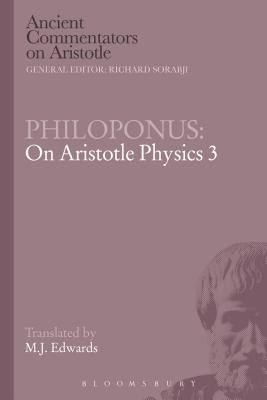
- We will send in 10–14 business days.
- Author: Mark Edwards
- Publisher: Bloomsbury Academic
- Year: 2014
- Pages: 224
- ISBN-10: 1780934343
- ISBN-13: 9781780934341
- Format: 15.6 x 23.4 x 1.2 cm, minkšti viršeliai
- Language: English
- SAVE -10% with code: EXTRA
Reviews
Description
Book 3 of Aristotle's Physics primarily concerns two important concepts for his theory of nature: change and infinity. Change is important because, in Book 2, he has defined nature - the subject-matter of the Physics - as an internal source of change. Much of his discussion is dedicated to showing that the change occurs in the patient which undergoes it, not in the agent which causes it. Thus Book 3 is an important step in clearing the way for Book 8's claims for a divine mover who causes change but in whom no change occurs.
The second half of Book 3 introduces Aristotle's doctrine of infinity as something which is always potential, never actual, never traversed and never multiplied. Here, as elsewhere, Philoponus the Christian turns Aristotle's own infinity arguments against the pagan Neoplatonist belief in a beginningless universe. Such a universe, Philoponus replies, would involve actual infinity of past years already traversed, and a multiple number of past days. The commentary also contains intimations of the doctrine of impetus - which has been regarded, in its medieval context, as a scientific revolution - as well as striking examples of Philoponus' use of thought experiments to establish philosophical and broadly scientific conclusions.
EXTRA 10 % discount with code: EXTRA
The promotion ends in 23d.10:50:41
The discount code is valid when purchasing from 10 €. Discounts do not stack.
- Author: Mark Edwards
- Publisher: Bloomsbury Academic
- Year: 2014
- Pages: 224
- ISBN-10: 1780934343
- ISBN-13: 9781780934341
- Format: 15.6 x 23.4 x 1.2 cm, minkšti viršeliai
- Language: English English
Book 3 of Aristotle's Physics primarily concerns two important concepts for his theory of nature: change and infinity. Change is important because, in Book 2, he has defined nature - the subject-matter of the Physics - as an internal source of change. Much of his discussion is dedicated to showing that the change occurs in the patient which undergoes it, not in the agent which causes it. Thus Book 3 is an important step in clearing the way for Book 8's claims for a divine mover who causes change but in whom no change occurs.
The second half of Book 3 introduces Aristotle's doctrine of infinity as something which is always potential, never actual, never traversed and never multiplied. Here, as elsewhere, Philoponus the Christian turns Aristotle's own infinity arguments against the pagan Neoplatonist belief in a beginningless universe. Such a universe, Philoponus replies, would involve actual infinity of past years already traversed, and a multiple number of past days. The commentary also contains intimations of the doctrine of impetus - which has been regarded, in its medieval context, as a scientific revolution - as well as striking examples of Philoponus' use of thought experiments to establish philosophical and broadly scientific conclusions.


Reviews